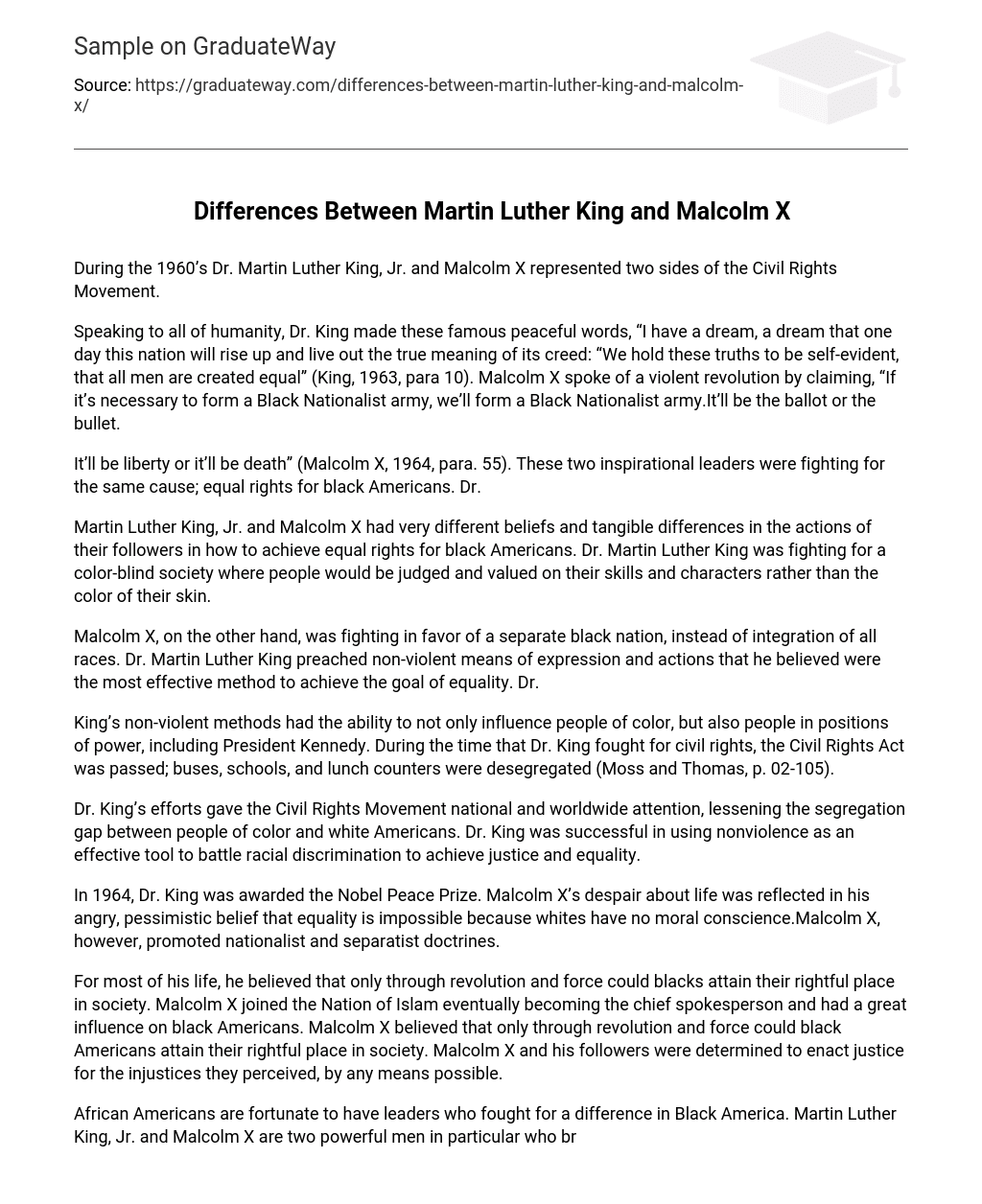Both Dr. Martin Luther King, Jr. and Malcolm X were significant individuals in the 1960s Civil Rights Movement.
Dr. King delivered his famous words of peace, expressing his dream for a nation that would finally embody the ideals of equality and justice for all. He stated, “I have a dream, a dream that one day this nation will rise up and live out the true meaning of its creed: ‘We hold these truths to be self-evident, that all men are created equal'” (King, 1963, para 10).
In contrast, Malcolm X advocated for a more radical approach, discussing the possibility of a violent revolution. He asserted, “If it’s necessary to form a Black Nationalist army, we’ll form a Black Nationalist army. It’ll be the ballot or the bullet.”
Both Malcolm X and Dr. King were ardent advocates for the equal rights of black Americans. Malcolm X is well-known for his iconic statement, “It’ll either be liberty or death” (1964, para. 55).
Martin Luther King, Jr. and Malcolm X had different principles and strategies in their fight for equal rights for African Americans. Dr. Martin Luther King believed in a society without racial bias, where people would be judged on their abilities and character rather than their race.
Although Dr. Martin Luther King advocated for non-violent means to achieve equality, Malcolm X supported the creation of a separate nation exclusively for black people instead of assimilating with other races.
Dr. King’s nonviolent tactics had an impact on people from various racial backgrounds and those in positions of authority, including President Kennedy. His campaign for equality resulted in the enactment of the Civil Rights Act, which facilitated the integration of buses, schools, and lunch counters (Moss and Thomas, p. 02-105).
Dr. King effectively used nonviolent methods to fight against racial discrimination, resulting in the attainment of justice and equality. These accomplishments received praise worldwide for the Civil Rights Movement and helped reduce segregation between people of color and white Americans.
Despite being awarded the Nobel Peace Prize in 1964, Dr. King’s belief in attaining equality was countered by Malcolm X’s pessimistic view that it was unachievable due to the lack of moral conscience among white individuals. Nonetheless, Malcolm X promoted nationalist and separatist ideologies.
Malcolm X firmly believed in the necessity of revolution and force to empower black Americans and ensure their rightful place in society. As he rose as the spokesperson for the Nation of Islam, his influence among the black community greatly grew. Malcolm X remained steadfast in his conviction that revolution and force were the only avenues for justice and equality for black Americans. He and his followers were fully dedicated to employing any means necessary to address perceived injustices.
Both Martin Luther King, Jr. and Malcolm X were significant figures in African American history as they strived to bring about positive change for the Black community in the United States. Despite encountering widespread racism and discrimination, both leaders instilled hope among Black individuals by highlighting their innate strength and ability to triumph over hardship.
Although Dr. Martin Luther King, Jr. and Malcolm X both aimed to achieve equality for colored people, their approaches differed due to their backgrounds, environments, and philosophies.
Dr. Martin Luther King played a significant role in influencing policies and leaders, bringing the dream of equality closer to reality. In contrast, Malcolm X’s violent actions and policies were less effective in achieving this goal. However, both leaders were assassinated by those who vehemently opposed their beliefs and movements. Despite this, they had a profound impact on history, inspiring a shift in people’s perspectives towards one another.





